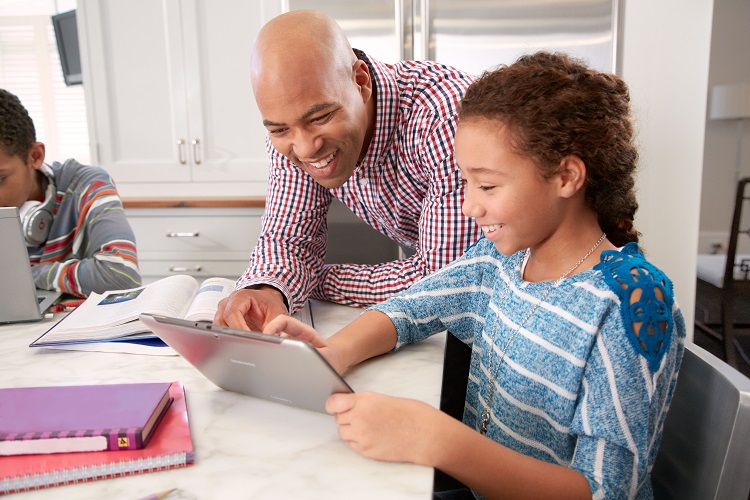The internet can be a fantastic learning tool, but some aspects aren’t so positive. With school back in session, now is the perfect time to talk to your kids about online safety.
We talked to Geek Squad Agent Will Woodworth, who teaches students about digital citizenship at our Geek Squad Academy camps, to learn more about what we can do to help keep our children safe. Here are a few tips.
1) Talk with your child about online safety
First things first, talk to your child about the importance of online safety and being a good digital citizen. Learn about what sites he or she likes to visit, and teach him or her how to evaluate the credibility of information they read online.
This can also serve as an opportunity to arm your son or daughter with the tools they need to mentally and emotionally deal with cyberbullying, sexting and other forms of abusive behavior that can follow them home from school these days. And it’s good to educate them about the real-life ramifications that inappropriate posts can have on their reputation (and potentially even their future careers).
“The goal isn’t to scare students about the content on the internet, but instead to try to help them make good decisions,” Will said.
2) Establish guidelines for internet usage
The internet is an excellent educational and recreational resource for children, but it’s still smart to set limits regarding screen time and the type of content they access. Stay involved with their internet usage and watch for behaviors that might need to be addressed.
“Trusting children is a good way to start,” Will said. “It’s generally best to only correct behavior that you have found to be a problem rather than trying to correct behaviors that haven’t existed yet.”
That said, it’s probably a good idea to set up parental controls on all internet-enabled devices to protect your child from unseemly content. And if you suspect any inappropriate activity, there are ways to more closely monitor or limit your child’s online activity. For example, you can set time restrictions on internet access for certain devices.
One more idea: Encourage students to create more than they consume. Instead of watching five hours of YouTube videos a day, perhaps they can use YouTube as a resource for learning how to do something new.
“It’s neat because it’s self-correcting,” Will said. “It’s not a parent being the bad guy by saying you can’t use YouTube. Instead, it’s trying to help students make the right decision on their own.”
3) Help your child curate his or her friend list
Be sure to talk to your children about who they are friends with online and how they know those people. Help them curate their friend lists to ensure they only include people they actually know in real life.
“Talk about the trust that goes into being friends with somebody and how that relates to the things they have access to just by looking at your profile as a ‘friend’ rather than a member of the public,” Will said. “If you accept a friend request from somebody you don’t really know, they gain access to personal information about you without ever corresponding directly with you.”
Help your son or daughter update the default settings on social media tools to “friends only.” And remind them not to give out personal information online or agree to meet people without you being present.
4) Encourage kids, and parents, not to broadcast their locations
Make sure your child isn’t announcing his or her location to the world by including geotagging information or easily identifiable images on social media posts.
“A good idea is to have your kids post location-based updates only after they’ve departed from that location,” Will said.
Parents, this advice goes for you, too. Don’t post photos of your children that clearly display your home address, the location of the bus stop or the site of after-school activities.
5) Emphasize the need to protect passwords
Explain to your children the importance of protecting their identities. Help them choose strong passwords for all accounts and encourage them to never share those passwords with anyone else, even close friends.
“Think of what could happen if someone were to have access to your accounts without your knowledge, making posts that look like they are from you because you used a password that is too simple or reused passwords on multiple websites,” Will said.
For more online safety tips, watch this video or stop into your local Best Buy store.


